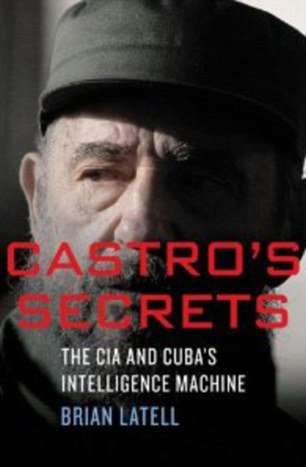
According to an explosive new book by retired CIA agent Brian Latell, which is set to be released next month, Fidel Castro had advance knowledge that President John F. Kennedy was about to be killed in 1963.
Rumors about Fidel Castro’s involvement in a plot to murder his fierce adversary have swirled for almost half a century since communist sympathizer Lee Harvey Oswald shot JFK during a trip to Dallas in November 1963.
Now author Brian Latell, who studied Cuban affairs as a CIA analyst in the 1960’s and later became the agency’s chief intelligence officer for Latin America, says he is certain that Fidel Castro at least knew the attack was going to happen.
On the morning of November 22, 1963, the day JFK was killed, Fidel Castro ordered a senior intelligence officer in Havana to stop listening for non-specific CIA radio communications and concentrate instead on “any little detail, any small detail from Texas”, Brian Latell claims in his new book “Castro’s Secrets – the CIA and Cuba’s Intelligence Machine”, set for release next month.
Four hours later, the airwaves came alive with news that John F. Kennedy was dead.

Brian Latell also claims that Fidel Castro was aware that Lee Harvey Oswald, who had been denied a visa to visit Cuba at the country’s embassy in Mexico City, told staff there that he was going to murder JFK to prove his allegiance to the communist cause.
“Fidel knew of Oswald’s intentions and did nothing to deter the act,” Brian Latell writes in the book.
In an interview published in The Miami Herald, Brian Latell, now a respected senior lecturer on Cuba at the University of Miami, says he discovered the information in interviews with former Cuban intelligence officers, backed up by declassified US government documents.
“I don’t say Fidel Castro ordered the assassination, I don’t say Oswald was under his control. He might have been, but I don’t argue that, because I was unable to find any evidence for that,” Brian Latell said.
“[But] everything I write is backed up by documents and on-the-record sources.
“Did Fidel want Kennedy dead? Yes. He feared Kennedy. And he knew Kennedy was gunning for him. In Fidel’s mind, he was probably acting in self-defense.”
Brian Latell’s book, billed as the first in-depth study of Fidel Castro’s intelligence operations in the years after the Marxist revolutionary seized power in a 1959 coup, says there is other strong supporting evidence.
The book claims, for instance, that CIA wiretaps of Cuban intelligence agents in the immediate aftermath of the assassination revealed that they already had surprising level of knowledge of Lee Harvey Oswald’s background when only scant details had been reported by the media.
But it is Brian Latell’s interview with former Cuban intelligence officer Fiorentino Aspillaga Lombard, who was in charge of Fidel Castro’s listeners at his Havana compound, which will raise eyebrows.
Fiorentino Aspillaga Lombard, who defected to the US in 1987, told the author that he informed the CIA at his debriefing that Fidel Castro personally issued the order to listen specifically for anything about Texas.
But that information was never revealed publicly, and he never repeated it until he was interviewed for the book.
After his defection, Fiorentino Aspillaga Lombard lifted the lid on Fidel Castro’s lavish lifestyle, giving details of his fleet of luxury yachts, numerous lavish properties in each of Cuba’s provinces and a secret Swiss bank account containing millions of dollars.
But he said that while the population realized that “Fidel has ruined Cuba”, a fear of their leader meant few would ever speak up.
“Who can sanction Castro? What parliament or national assembly can ask for an explanation of what is done with that money?” Fiorentino Aspillaga Lombard said.
The claim that Fidel Castro was aware of Lee Harvey Oswald’s promise to Cuban embassy officials that he was going to murder John F. Kennedy comes from several sources, including a former FBI informant and “superspy” Jack Childs, who penetrated the dictator’s inner circle.
Jack Childs said that Fidel Castro told him that Lee Harvey Oswald “stormed into the embassy, demanded the visa, and when it was refused to him headed out saying: <<I’m going to kill Kennedy for this>>.”
Meanwhile, Fidel Castro was claiming publicly that Lee Harvey Oswald’s visit to the embassy was “a minor matter” that had not been noticed by senior officials in Havana.
Subsequent investigations by the US security agencies, and the official Warren Commission inquiry into John F. Kennedy’s assassination, looked at Fidel Castro’s possible involvement but concluded that Lee Harvey Oswald was a lone gunman acting independently.
Among other issues discussed in Brian Latell’s book are the CIA’s own attempts to assassinate Fidel Castro using a variety of methods, including exploding cigars and poison pens. Brian Latell says the efforts were called off after JFK died.